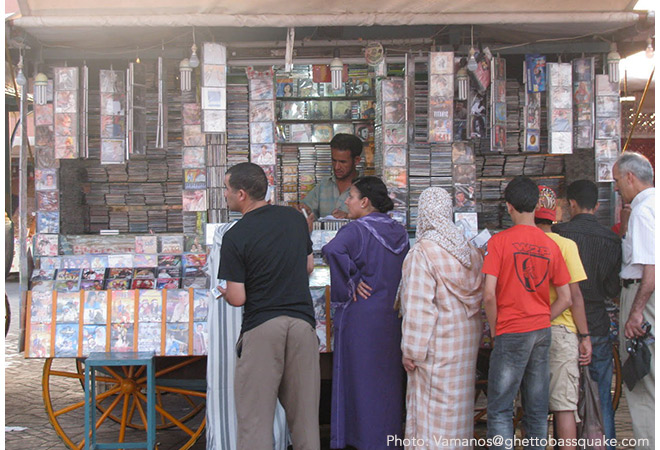Europe's online source of news, data & analysis for professionals involved in packaged media and new delivery technologies

Home video entertainment in Africa: banking on VOD?
As Europe and the US stagger out of recession (maybe), eyes are turning to Africa, a continent still showing steady economic growth. With a population of over a billion, about half of whom are under 25, there is a huge market for home entertainment there - but the challenges are enormous. In this second feature, ANTHONY OWEN, a DVD veteran with more than ten years experience in North Africa, signposts a roadmap.
Since the first colonial explorers made their way there in the 19th century, Africa has always been seen as a continent of great promise, though whether this promise can become a reality continues to be an open question.
The UN estimates that economic growth in the continent will average over 5% annually for the next decade, a figure which promises an ever growing market for western consumer goods as more and more of the indigenous population are raised out of poverty. Already the pattern in most African countries is that a small minority (5% to 10%) live at western material standards and enjoy the latest high tech. goods. In the richer areas large flat screen TVs with attached DVD and Blu-ray players are as common a sight in living rooms as they are in Europe, the US and Japan. Smart phones and tablets are similarly a 'must have' accessory for the better off and their children.
So, there is a market there, and a market which has the income, technology and desire to view the latest western films as home entertainment - the question is how can it be exploited?
Since the advent of DVD the home entertainment market has mainly been fulfilled by the pirates, street sellers with a huge stock of films, including the latest releases, burnt on disc. These are sourced from net torrents and duplicated in a widespread cottage industry, often by the vendor's own family, using consumer equipment. These are a common sight on every African street corner, and it is a trade which has a turnover of many tens, perhaps hundreds, of millions of dollars annually.
Though piracy is not necessarily encouraged by governments and the local administration they are not averse to 'saving' the national exchequer the amount which would be paid in royalties to content owners if home entertainment content were to be distributed legitimately on disc rather than by pirate traders. The vast employment offered in this shadow industry - hundreds of thousands earn an income from disc piracy across the continent - is also an element to be borne in mind when considering the attitude of governments there.

Governmental attitudes are not the only challenge. On a practical slevel logistics present an enormous problem. Transport infrastructure is not well developed in most African countries. Railways are often non-existent or have a very limited network and roads, particularly in the central part of the continent, are often washed out in the rainy season and may be insecure and their traffic subject to attack or robbery. A distance of a couple of hundred kilometres, a morning's journey in the 'West,' can take a day, or sometimes more, to travel. Even in the most developed countries in the continent shipping costs from outside - even by air - to the main ports of entry can be substantially lower than shipping costs within the country.
This is pespecially important as the African market is so price sensitive. Pirate discs generally sell at between $1 and $1.50, though market surveys carried out in some countries indicate that the consumer would be prepared, and able, to pay up to $3.50 per title for legitimate product, but with the world price of replicating - and packaging - discs now rising as volumes fall, the entire economic model is very delicately balanced and can be seriously damaged by only a small change in exchange rates, a distinct possibility in the present volatile economic circumstances.
The answer would seem to be to produce locally. Unfortunately, there is not only a lack of industrial disc replicators (though these do exist in both the north and south of the continent, and more are planned) but also a severe lack of skilled or trainable personnel able to operate and maintain the equipment. Intercontinental cross-border trade is also difficult in many cases for political, logistical and economic reasons. There is as well the question of security. It is unlikely that any content holder would wish to have their master copies sent to an environment where the rule of law is so sadly lacking.
For any foreign company seeking to expand into the African continent this lack of a workable legal framework is a very serious obstacle. In practice, though governments may sign all sorts of intellectual property rights agreements, it is the policeman on the street who has to enforce them, and the badly paid and seriously undermanned police are very tempted to turn a blind eye, especially when the vendor may be personally known to them. Not only this, but contract law is often non-existent or rudimentary and the courts are not known for either following the law nor enforcing their rulings. Furthermore, even governments themselves may be unstable and liable to overthrow, or to act in an arbitrary manner at very short notice.
If the outlook for optical media is bleak, that for video-on demand over the Internet looks far more promising. In the first place this directly targets the core, richer market who, in many cases, already own devices well able to display high quality video content, and ownership of suitable devices is beginning to spread across all classes.
Internet access, even at fairly high bandwidth, is expanding rapidly throughout the continent. Though the development of traditional landline, and hence cable broadband, has not followed western models, in a large part due to the distances and terrain involved, in many counties it exists in the major towns which are also concentrations of the richer minority of the population. Also, all countries now have a number of mobile operators, both local and major international providers, with some already switched to 3G and above and the rest are planning to do so in the short- or medium-term future. Their networks are widespread within the cities and are rapidly rolling out to cover even the most inaccessible parts of the countryside.
The continent itself is more and more connected to the international sub-oceanic global network, the ACE cable with a bandwidth of 1920 Gbits (feeding from the WACS 5120 Gbits cable) extends along the entire west African seaboard and comes ashore at 21 points, the 1400 Gbits EASSy cable - fed from the 3840 Gbits EIG cable in the north - comes ashore at eight points across north Africa and continues at 1400 Gbits to come ashore at five points in the east (with overland fibre cables in the process of being deployed to serve landlocked countries).
Whilst payment for Internet services is not particularly developed in the continent - credit card ownership in very low - there is potential for working in partnership with telecoms companies throughout the continent. As well as shifting the responsibility for marketing to them, VOD services may be deployed as an integral part of their consumer offering, allowing them to differentiate their service with such added value content - important where there is such fierce competition as there is in many African markets.
As an alternative, billing for content viewed may be incorporated with the provider's own charges, whether they be 'pay as you go' (the majority) or standard monthly billing. Partnerships with service operators also allows for DRM and other protection to sit seamlessly within the sub-domain structure of a network operator's own internet offering.

With delivery of Internet video services becoming more realistic, problems of language remain. There is widespread illiteracy and a stunning three thousand languages are spoken across the continent. As many of these are purely oral with no written equivalent, sub-titling is out of the question. However the former colonial languages (mainly English, French and Portuguese, depending on the country) are widely used and understood even among the poorer segment of the population, and the appropriate voice-over translation (or dubbing, if it exists) in one of these languages will be satisfactory for the majority of the audience.
In summing up, though it is possible for (paid for) VOD to be widely deployed if the correct strategy is followed it will certainly take a courageous content owner or distributor to exploit the potential which exists in Africa, despite the returns available there. But if the alternative is to write off the continent, then how will the 15% of the world?s population which lives there, and controls vast quantities of the resources needed for the world?s industries, ever be integrated into an increasingly globalised culture?

Anthony I.P. Owen had ten years experience working in the media industry in North Africa before being forced to return to the UK by the events of the 'Arab spring.' Before that he set up one of the first independent DVD studios in Europe and then managed the technical side of one of London's premier DVD studios. He may be contacted at antcasa@yahoo.com.
Story filed 20.02.14




















